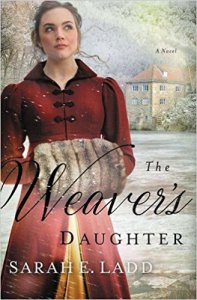 No one thought Henry Stockton would return from the war alive, and when the young heir to Stockton’s cloth mill comes back to the village, not everyone is happy about it. Things have changed in the three years he’s been away. There’s a growing feud between the mill owners and the weavers–who are convinced that the new machines are ungodly means of depriving them of their livelihood.
No one thought Henry Stockton would return from the war alive, and when the young heir to Stockton’s cloth mill comes back to the village, not everyone is happy about it. Things have changed in the three years he’s been away. There’s a growing feud between the mill owners and the weavers–who are convinced that the new machines are ungodly means of depriving them of their livelihood.
Kate Dearborne is in a difficult position. Her father is leader of the weavers, but her brother has defected to go work at the mill. Everyone knew that old Stockton didn’t care a whit for the weavers’ families, but the new heir Henry seems different. Kate befriends Henry’s sister and feels increasingly attracted to Henry’s care and kindness. But he’s still a Stockton, and she’s a Dearborne–if the weavers’ agitation turns to violence, which side will she take?
This Regency romance features on far more than balls and parties, showing the sea change that the Industrial Revolution created in small villages in England as artisans were replaced by manufacturers. Kate and Henry are both sympathetic characters, not afraid to stand up for what they believe in. Henry, in particular, is a rock for his sister to lean on and a fearless leader when protecting his own mill workers. He must learn to re-acclimate to civilian life after the horrors of war and discover just how important his grandfather’s work actually was for the village. Kate, on the other hand, must overcome her frustration at being overlooked by her father because of her sex and learn the virtue of forgiveness in a time where everyone is eager to take offense. This book was a quick and satisfying read, one of the most enjoyable Regency romances I’ve read in a long time.
Disclaimer: I received a complimentary copy of this book from the publisher via NetGalley. The opinions expressed in this review are my own.
Share this:




